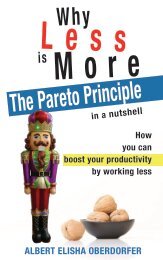HOW TO TEACH EFL AT A THAI UNIVERSITY WITH MINUMUM EFFORTS AND MAXIMUM RESULTS - ALBERT ELISHA OBERDORFER
The Pareto principle—the 80/20 rule—says that 20% of what we do causes 80% of the results. To be more productive, we need to find out what works and keep doing more of what works and less of what doesn’t. This is especially true in teaching. I have almost twenty years of experience teaching EFL at a Thai university. Much of what I did in my beginning years, I don’t do anymore. - Today, when I start teaching a course, I first try to precisely understand what the students will be tested on. That then determines what I will focus on in class. In other words, I try to have a clear goal. - Today, if students are supposed to do something, but it is not related to the focus of the class, I try to eliminate these tasks. - Today, I am also always trying to find ways how to simplify things in class. To save my time and my students’ time. So that we have more time to focus on essential tasks. - For example, today, I don’t check my students’ work for grammar mistakes anymore. This can be automated through a grammar program called ‘Grammarly’, for example. I am continually trying to find ways to automate processes. So that I don’t have to do them. Those annoying things that I otherwise would have to do over and over again. - Today, I rarely lecture to my students. Instead, I have them teach each other. I delegate much of my work to capable students. So that I can focus on higher-level tasks. So that I have more time to think about how to further improve my classes. Today, I am trying as much as possible to implement a simple process of goal setting, eliminating, simplifying, automating, and delegating. As a result, my students are learning better and more efficiently. And I have less work. It’s a win-win situation that all boils down to me using effective and efficient teaching methods.
The Pareto principle—the 80/20 rule—says that 20% of what we do causes 80% of the results.
To be more productive, we need to find out what works and keep doing more of what works and less of what doesn’t.
This is especially true in teaching.
I have almost twenty years of experience teaching EFL at a Thai university.
Much of what I did in my beginning years, I don’t do anymore.
- Today, when I start teaching a course, I first try to precisely understand what the students will be tested on.
That then determines what I will focus on in class.
In other words, I try to have a clear goal.
- Today, if students are supposed to do something, but it is not related to the focus of the class, I try to eliminate these tasks.
- Today, I am also always trying to find ways how to simplify things in class.
To save my time and my students’ time.
So that we have more time to focus on essential tasks.
- For example, today, I don’t check my students’ work for grammar mistakes anymore.
This can be automated through a grammar program called ‘Grammarly’, for example.
I am continually trying to find ways to automate processes.
So that I don’t have to do them.
Those annoying things that I otherwise would have to do over and over again.
- Today, I rarely lecture to my students. Instead, I have them teach each other.
I delegate much of my work to capable students.
So that I can focus on higher-level tasks.
So that I have more time to think about how to further improve my classes.
Today, I am trying as much as possible to implement a simple process of goal setting, eliminating, simplifying, automating, and delegating.
As a result, my students are learning better and more efficiently.
And I have less work.
It’s a win-win situation that all boils down to me using effective and efficient teaching methods.
Create successful ePaper yourself
Turn your PDF publications into a flip-book with our unique Google optimized e-Paper software.
<strong>ALBERT</strong> <strong>ELISHA</strong> <strong>OBERDORFER</strong>, MAG. PHIL. *<br />
* 34 + semesters teaching experience at a Thai university<br />
<strong>HOW</strong> <strong>TO</strong> <strong>TEACH</strong> <strong>EFL</strong><br />
<strong>AT</strong> A <strong>THAI</strong> <strong>UNIVERSITY</strong><br />
<strong>WITH</strong><br />
MINIMUM<br />
<strong>EFFORTS</strong><br />
<strong>AND</strong><br />
<strong>MAXIMUM</strong><br />
<strong>RESULTS</strong><br />
14 Simple, Practical, Proven<br />
Techniques & Strategies That Will<br />
Save You Time, Money & Energy and<br />
Increase Your Effectiveness Manifold<br />
1
The name of the game is to<br />
work smarter—not harder.<br />
2
KAIZEN.<br />
THE JAPANESE call it ‘Kaizen.’<br />
We call it continuous improvement.<br />
Continually upgrading.<br />
How much sense does it make to be<br />
spending hours upon hours cutting a piece<br />
of meat?<br />
With a knife that is not up to the task?<br />
Or blunt?<br />
It would make sense to invest half an hour<br />
into sharpening the knife.<br />
Or even buying a super sharp ceramic<br />
kitchen knife.<br />
3
4
The Pareto<br />
principle—<br />
the 80/20<br />
rule—says<br />
that 20%<br />
of what we<br />
do causes<br />
80% of the<br />
results. 1<br />
5
6
To be more<br />
productive,<br />
we need to<br />
find out what<br />
works and<br />
keep doing<br />
more of what<br />
works and<br />
less of what<br />
doesn’t.<br />
7
CONTENTS<br />
8<br />
KAIZEN. 3<br />
THE BUG TH<strong>AT</strong> CAME IN THE MORNING.<br />
DILIGENCE MAKES THE DAY—OR DOES IT? 13<br />
SUITED FOR THE HIGHEST OFFICE. 19<br />
SIMPLE, PRACTICAL, <strong>AND</strong> PROVEN<br />
TECHNIQUES <strong>AND</strong> STR<strong>AT</strong>EGIES.<br />
1 ELIMIN<strong>AT</strong>E. SIMPLIFY. AU<strong>TO</strong>M<strong>AT</strong>E.<br />
DELEG<strong>AT</strong>E. 25<br />
2 DON’T LECTURE. 35<br />
3 DON’T OVERWORK YOURSELF. 39<br />
4 SIMPLIFY. 43<br />
3 STREAMLINE YOUR COMMUNIC<strong>AT</strong>ION. 45<br />
4 DON’T REINVENT THE WHEEL. 51<br />
5 BE SELECTIVE. 55<br />
6 LESS IS MORE. 61<br />
7 THINK INPUT-OUTPUT. 65<br />
8 PLAN YOUR SCHEDULE WISELY. 67
9 FIRST THINGS FIRST. 69<br />
10 GRADE <strong>WITH</strong> STYLE. 73<br />
11 MAKE PARKINSON’S LAW WORK <strong>TO</strong> YOUR<br />
ADVANTAGE. 77<br />
12 PREVENTION IS BETTER THAN CURE. 81<br />
13 TAME THE SOCIAL MEDIA BEAST. 85<br />
14 DECISION-MAKING: A REVISED MODEL. 89<br />
9
10
THE BUG TH<strong>AT</strong> CAME<br />
IN THE MORNING.<br />
11
12
DILIGENCE MAKES<br />
THE DAY—OR DOES<br />
IT?<br />
I LOOKED at my watch, and it was just<br />
before 5 am.<br />
That’s when it came.<br />
I still remember it so well because when<br />
I heard the deep humming sound, I was<br />
so glad and curious at the same time.<br />
I had just finished grading the last<br />
pieces of the final exams of a reading<br />
and writing class—for those of you who<br />
know, it was 311 Reading and Writing<br />
1.<br />
I had started at around 10 pm the<br />
evening before and been super diligent<br />
in correcting every sentence of the<br />
students’ writings with a red pen in<br />
great detail.<br />
I felt like a keen editor for a peerreviewed<br />
journal. (Actually, I had done<br />
editing research papers for medical<br />
journals for my wife before then.)<br />
13
14
I needed to grade about 24 pieces of 1-pagelong<br />
writings.<br />
And it took me 8 hours of overnight hard<br />
work.<br />
So when I heard the beetle’s sound, I was<br />
so thankful that I had finished grading and<br />
that I got to see this exciting creature.<br />
I opened the door to our verandah and tried<br />
to locate it.<br />
It sat on a vine resting.<br />
I felt for it. Because it had this huge body<br />
and relatively small wings, in proportion to<br />
that huge fat body.<br />
So it sat there—a beautiful specimen.<br />
And I sympathized with it.<br />
Because I thought that it has to carry this<br />
huge body around on those relatively small<br />
wings.<br />
(According to the laws of aerodynamics,<br />
those creatures—like beetles and humming<br />
bees — are not even supposed to be able<br />
to fly.)<br />
And then the sun came up and flooded us<br />
with its glorious light.<br />
I was so glad and overjoyed that I got to<br />
see all this.<br />
15
16<br />
But the point is this.<br />
Today, I am grading the very same<br />
paragraphs in about 1/5 of the time.<br />
On that day it took me 8 hours.<br />
Today it takes me from 1 - 2 hours max.<br />
And I’m more effective in those 1 - 2 hours<br />
than I was in those 8 hours before.<br />
I give better and more accurate and useful<br />
feedback than before.<br />
I am learning that being diligent is not<br />
always a good thing.<br />
Only if it is smart diligence.<br />
Not necessarily hard work.<br />
Imagine the loaf of meat once again.<br />
Cutting it with a razor-sharp knife would<br />
do the job in a matter of minutes.<br />
But dabbling at it with an unsuitable<br />
knife—even if you were super dilligent!—<br />
might not get it done at all, and if with<br />
much sweat, very inefficient and very<br />
messy.<br />
It is the same with teaching.<br />
The name of the game in teaching is not<br />
hard work.<br />
The name of the game is to apply principles,<br />
methods, and techniques that are effective.
That can save your time, money, and energy<br />
while at the same time making you a more<br />
productive and effective teacher.<br />
I trust the principles and strategies that I<br />
have outlined in this book will help you do<br />
just that.<br />
USING A GADGET<br />
BOX SAVES YOU<br />
A LOT OF ENERGY<br />
TRYING <strong>TO</strong> CORRECT<br />
STUDENTS WHO ARE<br />
SOCIAL NETWORKING<br />
ON THEIR PHONES<br />
IN CLASS. [SEE 12.<br />
PREVENTION IS<br />
BETTER THAN CURE.]<br />
17
18
SUITED FOR THE<br />
HIGHEST OFFICE.<br />
RICHARD Koch, the author of the book<br />
the 80/20 principle, says this: 2<br />
One of my favorite quotations comes—<br />
rather oddly perhaps—from one of the<br />
Prussian army officers called Erich von<br />
Manstein who had this to say about his<br />
people. He said,<br />
“There are only four types of officers. First,<br />
there are the lazy, stupid ones” Now did he<br />
suggest firing these people? Not at all. He<br />
said, “Leave them alone. They do no harm.”<br />
Because at least they are lazy. “Second,<br />
there are the hard-working, intelligent<br />
ones.” Now, they are good, obviously. They<br />
make excellent staff officers ensuring that<br />
every aspect of the plan is very carefully<br />
considered. “And third, there are the hardworking,<br />
stupid ones. Now, these people,”<br />
he said, “are a menace. They must be fired<br />
at once. They create irrelevant work for<br />
everybody. And finally, there the intelligent<br />
lazy ones. Now, these people are suited for<br />
the highest office.”<br />
19
20<br />
She has it all worked out how to catch<br />
them. No stress for her.
So the good general was suggesting that<br />
whether you are smart or intelligent, it is<br />
actually much better to be lazy. Is this a<br />
silly paradox?<br />
Visualize it. Do you think that Warren Buffet<br />
is busy frantically crunching numbers at<br />
his desk?<br />
Do you think this is what Ruppert Murdoch<br />
spends his time doing? Do you imagine<br />
that Jim Clark does that?<br />
So Koch’s point is that smart work is what<br />
makes the day.<br />
And that being diligent not always actually<br />
helps but may even do harm.<br />
21
22
SIMPLE, PRACTICAL,<br />
<strong>AND</strong> PROVEN<br />
TECHNIQUES <strong>AND</strong><br />
STR<strong>AT</strong>EGIES.<br />
23
She has a strategy and a plan.<br />
24<br />
It’s all about the mindset.
1 ELIMIN<strong>AT</strong>E.<br />
SIMPLIFY. AU<strong>TO</strong>M<strong>AT</strong>E.<br />
DELEG<strong>AT</strong>E.<br />
USING this simple process will help you to<br />
get rid of unnecessary clutter in your life. 3<br />
4. DELEG<strong>AT</strong>E<br />
3. AU<strong>TO</strong>M<strong>AT</strong>E<br />
2. SIMPLIFY<br />
1. ELIMIN<strong>AT</strong>E<br />
Including in your teaching.<br />
1) ELIMIN<strong>AT</strong>E<br />
Approach a task by first asking this<br />
question,<br />
“Does this task need to be done?”<br />
If the answer is No, then do not do it.<br />
25
This sounds obvious, right?<br />
In my previous example of me grading 24<br />
final exam papers for 8 hours overnight, I<br />
should have asked myself this question.<br />
Is it necessary for me to give detailed<br />
feedback on these papers?<br />
The answer would have been ‘no.’<br />
For several reasons.<br />
I was only required to score the final exams.<br />
Not to give any feedback on the writing.<br />
Because the students never got to see their<br />
final exams anyway.<br />
So, in this case, it was a complete waste of<br />
time.<br />
Except that I got to see the bug in the<br />
morning and a most sublime sunrise, which<br />
I would not have seen otherwise because I<br />
would have been sleeping.<br />
So maybe just for seeing this unique beetle<br />
and the sunrise, it was worth it.<br />
Back to the point.<br />
Many tasks you might be doing as a teacher<br />
are not necessary.<br />
They do not help neither you nor the<br />
students.<br />
So why do such tasks then?<br />
26
So the first step in this decision making<br />
process model requires us to think first<br />
before doing anything.<br />
“Is it really indispensable for me to do this<br />
task?”<br />
This is a very valid question when it comes<br />
to focusing on what kind of activities you<br />
should include in your teaching activities.<br />
It is vital that you focus on activities that the<br />
students will be tested on in their in-class<br />
tests and their mid-term and final exams.<br />
Otherwise, it is not fair for the students.<br />
It’s like a swimmer who practices freestyle<br />
a lot.<br />
But then in the competition, she is supposed<br />
to race in a butterfly race.<br />
She needs to be practicing swimming<br />
butterfly if she gets will take part in a<br />
butterfly race.<br />
This sounds very obvious.<br />
But you will often find in textbooks<br />
that many activities do not necessarily<br />
contribute to the clear learning objective.<br />
Take a course, for example, in which the<br />
students learn how to write a paragraph<br />
and how to take notes.<br />
27
They are tested in several in-class writing<br />
tests and their mid-term and final exams on<br />
their skills in writing a coherent, logically<br />
structured paragraph.<br />
Then this is what the teacher in this class<br />
should be mainly focusing on.<br />
He should include lots of activities in<br />
which the students get to write paragraphs<br />
in class.<br />
Because this is what the students will be<br />
tested on.<br />
And the teacher should include lots of<br />
activities that allow the students to practice<br />
note-taking if this is what the students will<br />
be tested on.<br />
The teacher should feel very free to cut<br />
out (eliminate) any activities that do not<br />
directly contribute to this clear learning<br />
objective.<br />
So step 1 is ‘Eliminate’.<br />
2) Step 2 is ‘SIMPLIFY.’<br />
If you decide to do a task because you<br />
think it is essential to do it, you can ask the<br />
next question.<br />
“Can this task be simplified?”<br />
So you are trying to find ways how to make<br />
complicated things easy.<br />
28
You are trying to declutter stuff.<br />
For example, when you are giving<br />
instructions<br />
3) ‘AU<strong>TO</strong>M<strong>AT</strong>E.’<br />
Ask the question, ‘Can this task be<br />
automated?<br />
So that I do not have to do it?<br />
But that there is a system in place that does<br />
it for me?<br />
For example, I have seen teachers setting<br />
up a laptop at the door of a classroom.<br />
Then they have the students who come in<br />
scan something or click something on the<br />
laptop.<br />
So the system is doing the class attendance<br />
for the teacher automatically.<br />
This would save a lot of time.<br />
So look for ways to automate some<br />
processes so that you do not need to do<br />
them.<br />
Your aim is to be as effective as possible, so<br />
you can spend your valuable time focusing<br />
on being a learning facilitator.<br />
You do not want to waste a lot of time, for<br />
example, on administrative stuff that can<br />
be automated.<br />
29
4) The last step is ‘DELEG<strong>AT</strong>E.’<br />
Ask yourself the question, “Can this task<br />
be delegated?<br />
There are myriads of tasks that you can<br />
delegate as a teacher.<br />
Wiping the whiteboard clean for example<br />
is a simple task that you can delegate to<br />
your students.<br />
Turning on and off electrical equipment,<br />
air conditioners, lights, fans, changing the<br />
seating arrangement, etc.<br />
All these tasks can be delegated.<br />
Even grading multiple choice exams.<br />
I am asking our house helper to do it for<br />
me.<br />
I show her clearly how to do it, then doublecheck<br />
that she has understood what she is<br />
supposed to do, and then I let her do it.<br />
She doesn’t understand English.<br />
But she can still help me because this is a<br />
task almost anybody can do it.<br />
It would be a waste of my precious time<br />
to do it because I can do something more<br />
meaningful in the meantime.<br />
I even pay her for it because my hourly<br />
rates are higher than hers.<br />
30
So it also makes sense to delegate this<br />
work to her from an economic point of<br />
view.<br />
If you learn how to delegate, you can save<br />
money because you can spend your time<br />
doing things that are more valuable than<br />
doing menial tasks.<br />
In my case, I prefer writing books instead<br />
of grading multiple-choice exams.<br />
So if you can apply this simple process<br />
of asking yourself these 4 questions, it<br />
will help you to much in the process of<br />
becoming a more efficient and effective<br />
teacher.<br />
[See flowchart ‘Standard Decision-<br />
Making Process’ on the next page.]<br />
31
32
ST<strong>AND</strong>ARD DECISON-MAKING<br />
PROCESS<br />
Do it<br />
No<br />
Can I delegate this task?<br />
Yes<br />
Delegate<br />
No<br />
Can I automate this task?<br />
Yes<br />
Automate<br />
No<br />
Can I simplify this task?<br />
Yes<br />
Simplify<br />
Yes<br />
Can I eliminate this task?<br />
No<br />
Do not do it<br />
33
34<br />
Teacher talk.
2 DON’T LECTURE.<br />
APPLY action learning principles instead<br />
of lecturing to your students.<br />
It’s more fun for them, and it is more fun<br />
for you.<br />
And they are learning better.<br />
Learning by listening is not effective.<br />
Instead, have them do something.<br />
Put them in the driver’s seat.<br />
Let them talk.<br />
Let them explain something.<br />
35
36
Let them practice.<br />
Randomize.<br />
Change your classroom to be a place of<br />
learning.<br />
Apply student-centered learning principles.<br />
Be a learning facilitator.<br />
Don’t think that you have to deliver content<br />
to your students.<br />
Especially if it is content that your students<br />
will easily forget anyway.<br />
Because they learn extremely little by<br />
being passive listeners.<br />
I’d like to recommend a book that I<br />
have written to help teachers transition<br />
from being lecturers to being learning<br />
facilitators.<br />
It is called ‘Upgrade Your Teaching<br />
Style: 68 Practical, Proven Techniques<br />
& Strategies How to Facilitate Effective,<br />
Creative & Fun-Filled Student-Centered<br />
Learning in an Institutional Asian <strong>EFL</strong><br />
Setting.<br />
37
38
3 DON’T OVERWORK<br />
YOURSELF.<br />
THERE IS a saying ‘organize or agonize.’<br />
Preserve your energy inside and outside<br />
the classroom.<br />
For example, there is so much that you<br />
delegate to your students (as we’ve<br />
mentioned before).<br />
It is all a matter of organizing and coming<br />
up with useful ideas.<br />
With a little planning ahead, you can save<br />
time.<br />
Let’s say your students have just finished<br />
an in-class writing exam, and they are<br />
about to hand in their papers (an outline<br />
and a paragraph).<br />
You only need to grade the paragraphs (not<br />
the outlines).<br />
So you create two stacks of paper.<br />
A stack with the outlines.<br />
And a stack with the paragraphs.<br />
39
As the students are handing in their work,<br />
they need to put their outlines on one stack<br />
and their paragraphs on another pile.<br />
So when you get home and do the grading,<br />
you then do not need to separate the exam<br />
papers.<br />
It is already done.<br />
A little planning and foresight have saved<br />
you a few minutes.<br />
That’s how long it would have taken you<br />
to separate the exam papers at home by<br />
yourself.<br />
Instead, you had the students do it.<br />
So you saved a few minutes.<br />
This is a simple example, but<br />
the key is that when you are<br />
looking out for opportunities<br />
to do things more effectively,<br />
you will find them.<br />
Here is another example.<br />
Suppose you need to grade<br />
an exam.<br />
The answer sheet may look<br />
something like this.<br />
In that case, make a template: simply box<br />
in the right answers on transparency.<br />
40
Then place the transparency over an exam<br />
paper, count the number of the correct<br />
answers, and write it down.<br />
No circling of correct answers.<br />
No crossing out of incorrect answers.<br />
No looking back and forth between the<br />
sheet with the answer key and the exam<br />
paper.<br />
It takes about 5 minutes to make a template.<br />
But this method enables you to be 3-times<br />
faster than by using the conventional way<br />
and allows you to be more accurate.<br />
I have seen teachers make a template by<br />
cutting out the boxes that display the correct<br />
answer. Then they would use a highlighter<br />
and highlight the correct answer on the<br />
exam paper.<br />
It takes more time to create this kind of<br />
template, and even highlighting the right<br />
answers on the exam paper is unnecessary<br />
as it takes time.<br />
So as a teacher, you can always look out<br />
for ways how to make your life easier.<br />
Without being less effective.<br />
That is the beauty of smart solutions.<br />
You are faster and more effective at the<br />
same time.<br />
41
42
4 SIMPLIFY.<br />
USE ONE schoolbag for your stuff.<br />
Put all the folders you need into that bag.<br />
Don’t take stuff in and out.<br />
To save time.<br />
Use one light plastic folder with the<br />
attendance sheets and schedules and<br />
curricula of all of your classes.<br />
So all your essential pages are in one place.<br />
They are neatly organized.<br />
This makes you save time, and it makes<br />
you more productive.<br />
Be always on the lookout of how you can<br />
de-clutter and simplify your life.<br />
And your teaching.<br />
43
44
3 STREAMLINE YOUR<br />
COMMUNIC<strong>AT</strong>ION.<br />
USE LINE groups to communicate with<br />
your students.<br />
Give them instructions.<br />
Send them information such as answer<br />
keys.<br />
Ask them to post their work, and then<br />
selectively give feedback.<br />
In that way, the whole class can benefit.<br />
If you give your students individual<br />
feedback, the rest of the class can’t benefit<br />
from that.<br />
But if you do it in the LINE group, the rest<br />
of the class can learn from your feedback.<br />
You can even teach a whole class on LINE.<br />
The possibilities are endless.<br />
One word of caution, though.<br />
Be very careful what and how you say things<br />
in the LINE group because everything is<br />
public.<br />
45
46
You need to be aware of that.<br />
Sometimes students will also want to talk<br />
to you privately and ask you questions<br />
about something.<br />
In that case, you can clarify to them that<br />
you do not talk to students personally (in a<br />
separate LINE group when they send you<br />
a message directly).<br />
Tell them to post their question(s) in the<br />
group.<br />
Make this clear to the class.<br />
In that way, others in the class can also<br />
benefit from your answers, and it is also<br />
safer for you.<br />
Make sure that you don’t waste your time<br />
by replying to the students at all times.<br />
Only when you have allocated that time<br />
for that.<br />
Otherwise, being always available and<br />
responding immediately to people can<br />
cause you to be quite ineffective.<br />
Because every time you reply to LINE<br />
unscheduled, it disrupts your attention<br />
from what you are currently focused on.<br />
For some teachers, to become more<br />
productive, they may need to learn how to<br />
use their mobile phones wisely, particularly<br />
in social networking.<br />
47
48<br />
Become phone-wise so that your mobile<br />
phone doesn’t become a distracting and<br />
time-stealing force in your life.
49
50<br />
This does it for me.
4 DON’T REINVENT<br />
THE WHEEL.<br />
IF YOU run into some problem with your<br />
teaching, don’t be shy to ask for help.<br />
There is no need for you to reinvent<br />
the wheel because if you have run into<br />
some problem teaching, your colleagues<br />
will have likewise. Some of them might<br />
already have come up with a solution to<br />
the problem.<br />
So don’t be shy to ask your colleagues<br />
how they do something or what they are<br />
thinking about some issues.<br />
In the overwhelming majority of cases,<br />
they will be more than willing to share<br />
their ideas with you.<br />
They might even be willing to share with<br />
you some of their supplementary teaching<br />
materials.<br />
Sure, you will need to critically evaluate<br />
if others’ material is suitable for your<br />
teaching style and purpose.<br />
51
52<br />
But if your colleagues have shared with<br />
you some teaching tips or materials, do<br />
your best to retaliate. This then will create<br />
a pleasant atmosphere amongst you and<br />
your fellow teachers.
53
54<br />
This is a selective close-up photo of a brown<br />
dachshund dog with a white scarf.
5 BE SELECTIVE.<br />
LAST WEEK while I was hiking on the<br />
Doi Suthep mountain in Chiang Mai, I met<br />
Kirk from America.<br />
Afterward, we had a fresh fruit frappe at a<br />
local market and had a chat.<br />
Kirk sometimes has food at the canteen of<br />
the Social Sciences faculty.<br />
He told me that he is sometimes approached<br />
by students who hand him over their<br />
assignment and kindly ask him if he could<br />
help them correct the grammar.<br />
Kirk asked me what I would suggest to<br />
him to do in that case.<br />
Do it for them?<br />
Or say ‘no’?<br />
I suggested him to give selective feedback.<br />
I do the same in my writing classes.<br />
It saves a lot of my time and helps the<br />
students because I don’t do the work for<br />
them.<br />
55
For example, when I give students feedback<br />
on their grammar, I don’t correct anything<br />
for them; that is, I don’t do the work for<br />
them.<br />
What I will do is this.<br />
I come up with some correction codes<br />
for grammar mistakes, such as SVA for<br />
subject-verb agreement mistakes, or<br />
FRAG for sentence fragments or RUN-On<br />
for run-on sentences and so on.<br />
Then I selectively focus on about 3 mistakes<br />
and give feedback on those 3 mistakes.<br />
So I don’t correct every sentence and every<br />
mistake for them.<br />
Instead, I write down correction codes next<br />
to the sentences with the mistakes.<br />
Then the students need to identify the<br />
mistakes and correct them.<br />
Once they have mastered those 3 grammar<br />
mistakes, I then move on to 3 more errors.<br />
And so on.<br />
This is also what I told Kirk.<br />
I suggested that he not correct the students’<br />
work and do it for them, but give them<br />
selective feedback on a few points and then<br />
send them back to correct those mistakes<br />
by themselves.<br />
56
SMART THINKING LEADS <strong>TO</strong> THE<br />
RIGHT DECISIONS. <strong>TEACH</strong>ING IS<br />
NOT ABOUT TALKING SO TH<strong>AT</strong> YOUR<br />
STUDENTS UNDERST<strong>AND</strong>. <strong>TEACH</strong>ING<br />
IS ABOUT THINKING HARD, WHICH<br />
KIND OF ACTIVITIES <strong>AND</strong> LEARNING<br />
STYLES ARE MOST EFFECTIVE, <strong>AND</strong><br />
THEN IMPLEMENTING THEM WISELY.<br />
[SEE 14 DECISION-MAKING—A<br />
REVISED MODEL.]<br />
57
58
Your students are not babies. It’s not your<br />
responsibility to spoon-feed them. If you teach<br />
them to take responsibility for their learning,<br />
they will become mature and effective learners.<br />
59
60
6 LESS IS MORE.<br />
BE CAREFUL about overloading your<br />
students with content.<br />
You shouldn’t just because your schedule<br />
says that you need to finish this section of<br />
the book by such and such a date.<br />
Instead, focus on crucial tasks.<br />
Less is more.<br />
Especially when it comes to how content is<br />
delivered or acquired.<br />
It may be easy for teachers to bulldoze<br />
through content in the book by giving an<br />
excellent power-point presentation and<br />
well structured and thought out lecture.<br />
However, the problem is that students do<br />
not learn by listening.<br />
They learn by doing.<br />
Task-based instruction is hugely more<br />
effective than lecture-based instruction.<br />
You may want to look at classrooms where<br />
the teacher is lecturing.<br />
It is not the student’s fault that they are so<br />
easily distracted by their phones.<br />
61
Good teaching doesn’t equal learning.<br />
So less is more.<br />
Focus on a limited number of learning<br />
points and then structure your teaching so<br />
that it is genuinely student-focused and<br />
task-based.<br />
Then your students will learn more.<br />
You may cover less content.<br />
Yes. But your students will still overall<br />
learn more.<br />
Because just because you have covered<br />
some content does not automatically mean<br />
that students have also learned much.<br />
If anything at all.<br />
The only way we can know if students<br />
have acquired a particular skill after they<br />
have gone through the learning process is<br />
by testing them.<br />
So learning needs to include a testing<br />
process.<br />
This process is also called participatory<br />
learning.<br />
Only if students are undergoing this<br />
learning process can we know whether or<br />
not they have actually acquired a particular<br />
skill.<br />
62
It’s showtime.<br />
63
64
7 THINK INPUT-<br />
OUTPUT.<br />
THINK in terms of effectiveness.<br />
How can I do things effectively?<br />
You want to be as effective as possible<br />
with the least possible input.<br />
Think of the Pareto (80/20) principle.<br />
The key is not to work harder.<br />
The key is to work smarter.<br />
So the question is, “How can I have the<br />
greatest impact on my students with the<br />
least possible efforts?”<br />
Which kind of activities can I have them<br />
do that do not require a lot of effort on my<br />
part but are hugely useful?<br />
65
66<br />
Your time is valuable.
8 PLAN YOUR<br />
SCHEDULE WISELY.<br />
BLOCK your teaching, when you have the<br />
choice to do that.<br />
You may be teaching at a university.<br />
See if you can block your teaching<br />
assignments.<br />
Let’s say teach only two days a week full<br />
out instead of teaching on all days of the<br />
week a few hours.<br />
This will save you time commuting to and<br />
from work.<br />
Figure in the time you need to get to your<br />
workplace.<br />
And see if there are more efficient ways<br />
how you can structure your daily activities,<br />
including your work schedule.<br />
67
68<br />
Some things are more important than others.
9 FIRST THINGS FIRST.<br />
BEFORE you start teaching a subject, do<br />
this.<br />
Make sure that you, as a teacher, understand<br />
clearly what the students will be tested<br />
on. This will then become your learning<br />
objectives.<br />
Let’s say you are teaching a writing<br />
class, and in the course, the students will<br />
need to be able to write different types of<br />
paragraphs.<br />
This will then be your clear learning<br />
objective.<br />
For example,<br />
“My students will need to able to write<br />
three types of paragraphs: a descriptive<br />
paragraph, a narrative, and a reason<br />
paragraph.”<br />
“They will need to understand the paragraph<br />
writing process.”<br />
“This includes brainstorming (gathering<br />
ideas) and outlining (structuring ideas).”<br />
“After that, writing the first draft<br />
(changing the ideas from the outline into<br />
grammatically correct sentences).”<br />
69
WASH BACK.<br />
70
“And finally, revising (identifying grammar<br />
mistakes and correcting them).”<br />
If you know what skills the students will<br />
need to be able to master, you can focus on<br />
having them practice those specific skills.<br />
This is basic logic.<br />
Sometimes you will find that what students<br />
are supposed to practice in a textbook and<br />
what they will then be tested on doesn’t<br />
always coincide. In that case, you can focus<br />
on first things first. Have them practice<br />
the skills they need to be able to master<br />
for their exams.(Technically, this is called<br />
‘washback.)<br />
Eliminate (cut out) the things that the<br />
students don’t need to know and focus on<br />
what they need to know.<br />
One of the first things you need to do when<br />
you start teaching a class is finding out<br />
what the clear learning objectives are.<br />
But beware: Sometimes, the curriculum<br />
will state some learning objectives that the<br />
students are not really tested on.<br />
You don’t want to be wasting precious time<br />
focusing on minors.<br />
Focus on important things first.<br />
71
72<br />
A-grade.
10 GRADE <strong>WITH</strong><br />
STYLE.<br />
YOU WANT to grade as efficiently and<br />
effectively as you can.<br />
Remember our Eliminate-Simplify-<br />
Automate-Delegate process?<br />
Your first question when you are about to<br />
grade something should be, “Do I need to<br />
grade this?”<br />
You may be wasting time grading something<br />
and giving too detailed feedback when it is<br />
unnecessary and ineffective.<br />
In my case, I often remind myself of the<br />
experience I had when I was grading exam<br />
papers overnight. [See The Bug That Came<br />
in the Morning.]<br />
If you have to grade something, then look<br />
for ways to simplify the process.<br />
For example, give selective feedback.<br />
Or come up with a simple template. [See 3.<br />
Don’t Overwork Yourself.]<br />
In some courses, the university will<br />
automate the grading process, such as<br />
73
when students need to take multiple-choice<br />
tests.<br />
This is the good of us as teachers because<br />
then we don’t need to do any grading.<br />
(Of course, this kind of testing is not very<br />
useful when it comes to learning. But that’s<br />
beside the topic.)<br />
But you may also be able to find ways how<br />
you can delegate the grading.<br />
In my case, I have started to ask our<br />
housemaid to grade yes/no tests or multiplechoice<br />
tests for me.<br />
She can’t speak English, so I need to make<br />
sure she knows what she needs to do.<br />
I will first show her what to do (follow an<br />
answer key).<br />
Then I will let her do it under my<br />
supervision.<br />
And when I feel that she can do it, I will let<br />
her do it on her own.<br />
In the end, I will also do spot checks to<br />
make sure that everything is up-to-par.<br />
Delegating is a great time- and moneysaving<br />
tool.<br />
It frees us from doing mundane tasks that<br />
we can easily delegate and pay people for.<br />
74
From an economic point of view, it doesn’t<br />
make sense to do any work that others<br />
could do for you at an hourly rate lower<br />
than yours.<br />
If you learn how to delegate, it will save<br />
you a lot of time and money.<br />
So you can have more time and money to<br />
focus on things that only you can do.<br />
Things that you want to do.<br />
(Like writing a book, for example.)<br />
In the case of a complex operation, there<br />
would be a team of medical workers<br />
working together.<br />
The chief<br />
surgeon will<br />
only do the<br />
most critical<br />
tasks.<br />
She will<br />
delegate the<br />
rest to her<br />
team, and only<br />
focus on doing<br />
that part that<br />
only she can<br />
do.<br />
Anything else<br />
would be a<br />
waste of her time.<br />
75
76<br />
This commodity will eventually run out.
11 MAKE<br />
PARKINSON’S LAW<br />
WORK <strong>TO</strong> YOUR<br />
ADVANTAGE.<br />
PARKINSON’S law says that a task grows<br />
in accordance to the time allotted to it.<br />
If you allow too much time for a task to be<br />
completed, it will take up that amount of<br />
time.<br />
So, in short, things can be done much faster<br />
than we might initially think.<br />
And doing something faster does not mean<br />
that the quality will suffer.<br />
Instead, the opposite is the case.<br />
In the past, it used to take me 8 hours to<br />
grade 24 one-page-long paragraphs.<br />
Now I can do it in 1 hour.<br />
I am more effective, efficient, and more<br />
accurate.<br />
Because when I do the grading, I am at my<br />
peak.<br />
77
78<br />
The best solution is to turn it off.
So my advice to you is this.<br />
When you do a task, do it with all your<br />
might.<br />
Don’t do it halfheartedly.<br />
What do I mean by this?<br />
I mean, put away your mobile phone while<br />
you are focusing on grading.<br />
Turn it off.<br />
Put it in a different room.<br />
Being constantly interrupted by notification<br />
and sound signals on your phone while<br />
working is a complete productivity killer.<br />
It fragments our attention.<br />
It makes us abysmally ineffective.<br />
You may want to do some research on this<br />
topic. (How does being online all the time<br />
and allowing yourself to be continuously<br />
distracted by social media affect your work<br />
performance?)<br />
You will be shocked.<br />
The phone is a complete productivity<br />
killer.<br />
If not managed drastically, it dulls us.<br />
79
An elegant solution.<br />
80
12 PREVENTION IS<br />
BETTER THAN CURE.<br />
THIS IS a given.<br />
Prevention is better than cure.<br />
To invest time and money in prevention is<br />
much better than spending time and money<br />
in a cure.<br />
Countries know that.<br />
Or they should know.<br />
So I suggest, for the sake of your students,<br />
consider using a gadget box. Help them<br />
to learn better by removing any potential<br />
distractions so that they can focus.<br />
Bring a box, a foldable container, even a<br />
plastic bag to class.<br />
Then, at the beginning of a class, tell<br />
your students to put their gadgets (mobile<br />
phones) into the gadget box.<br />
Unless you have planned to let them use<br />
their phones.<br />
In case you want to do some exercises<br />
with them through a social networking<br />
application, such as LINE.<br />
81
82<br />
What else is there to do?
In that case, let them keep their phones.<br />
Otherwise, ask them to put their phones in<br />
the gadget box.<br />
And make sure that at the end of the class,<br />
remind them to pick up their phones from<br />
the gadget box again.<br />
IT ALSO HAS <strong>TO</strong> DO <strong>WITH</strong><br />
THE CLASS ACTIVITIES.<br />
IF THE CLASS ACTIVITIES<br />
ARE ENGAGING ENOUGH,<br />
STUDENTS WILL NOT HAVE<br />
TIME <strong>TO</strong> ACCESS SOCIAL<br />
MEDIA DURING CLASS.<br />
[SEE 2. DON’T LECTURE.]<br />
83
84<br />
This creature needs to be handled with care.
13 TAME THE SOCIAL<br />
MEDIA BEAST.<br />
<strong>TO</strong> BE MORE effective in your teaching,<br />
even in your life in general, curb your<br />
mobile phone use.<br />
Don’t allow social media to interrupt you<br />
while you are doing essential tasks.<br />
The problem is the notifications on our<br />
phones that always keep popping up and<br />
sound effects (‘bling’).<br />
This disrupts our attention and severely<br />
affects our productivity level.<br />
Many people, the first thing they do in the<br />
morning, is going through the notifications<br />
on their phones and follow up on social<br />
networking threads.<br />
Don’t do this.<br />
If you do it, it will drain your mind power.<br />
You will start to think about all kinds of<br />
issues that other people are throwing at<br />
you.<br />
But these are not your issues. These are<br />
not the issues that will help you to move<br />
forward in your life.<br />
85
86<br />
This dog thinks she is the boss.
Imagine that your goal is to grade a stack<br />
of student papers.<br />
You want to do it most efficiently and<br />
effectively.<br />
While you are doing it, turn your phone<br />
off. Be unavailable. Completely. And<br />
focus all your undivided attention on the<br />
task right before you. You will be surprised<br />
how efficient you are.<br />
If you allow social media to fragment your<br />
attention, you will become hugely less<br />
effective.<br />
Because once your attention has been<br />
diverted, it is hard to reach the same level<br />
of focus as before.<br />
While I am writing, my phone is on Flight<br />
Mode.<br />
And in case I am using my<br />
phone’s personal hotspot,<br />
the ‘Don’t Disturb Mode’<br />
is on.<br />
This does wonder for my<br />
productivity. It will do the<br />
same for you.<br />
SHE IS LEARNING<br />
TH<strong>AT</strong> SHE IS NOT<br />
THE BOSS.<br />
87
88<br />
We need a goal.
14 DECISION-MAKING:<br />
A REVISED MODEL.<br />
HERE’S a revised model of the decisionmaking<br />
process.<br />
Before starting the process of elimination,<br />
you need to ask the question, “What is (or<br />
are) my clear goal of goals?<br />
In other words, you need to define your<br />
goals.<br />
Without a clear goal, it is difficult to score.<br />
1) Define.<br />
2. ELIMIN<strong>AT</strong>E<br />
1. DEFINE<br />
6. DO HIGHER-LEVEL WORK<br />
4. AU<strong>TO</strong>M<strong>AT</strong>E<br />
3. SIMPLIFY<br />
5. DELEG<strong>AT</strong>E<br />
89
90
So, before you start teaching a class,<br />
determine the clear learning goals or<br />
learning objectives.<br />
To get a good idea, look at previous exams<br />
(if possible) to get a clear picture of the<br />
overall learning goals.<br />
Once you have established clear learning<br />
goals, you can move on to the next step.<br />
2) Eliminate.<br />
As we’ve said before, try and cut out any<br />
learning activities that do not contribute to<br />
specific learning objectives.<br />
It would make little sense to be practicing<br />
how to swim butterfly if you are goal is to<br />
participate in a freestyle race.<br />
So you will find that once you have<br />
established and are clear on the learning<br />
objectives, you will be able to cut out<br />
things.<br />
Then you can use the time you have<br />
saved by cutting things out for necessary<br />
(essential) issues.<br />
3) Simplify.<br />
This is a powerful idea.<br />
It helps students immensely if you can<br />
present critical ideas and learning points to<br />
them as simply as possible.<br />
91
92<br />
Without having a target it is hard to score.
Let’s say you are teaching a writing class.<br />
Students will need to be able to write a<br />
concise, lucid, and coherent paragraph.<br />
They will need to be able to master the<br />
process of paragraph writing. This includes<br />
brainstorming (i.e., gathering ideas),<br />
outlining (i.e., structuring ideas), and<br />
writing a grammatically correct paragraph<br />
(i.e., the process of drafting and revising).<br />
If you give them a simple handout that<br />
clarifies this process, it will help them<br />
immensely. [See next page.]<br />
You may be able to summarize the concepts<br />
of 30 pages of a textbook and present it to<br />
your students on a few pages.<br />
4) Automate.<br />
The next step in the decision-making<br />
process is ‘automate.’<br />
Let’s stick with the topic of paragraph<br />
writing.<br />
To be able to write grammatically correct<br />
sentences, students need to be able to<br />
master specific writing skills.<br />
Such as to write sentences without subjectverb-agreement<br />
mistakes or avoid sentence<br />
fragments and run-on sentences, etc.<br />
You may be able to find online exercises<br />
that you can have your students do.<br />
93
You can automate this process.<br />
Instead of you going over stacks of papers<br />
of your students’ writings and painstakingly<br />
giving them feedback on grammar points,<br />
a program will do that for you.<br />
There are tons of grammar exercising<br />
programs and websites available for free.<br />
So, instead of overworking yourself,<br />
you can automate this process of helping<br />
students improve their grammar skills.<br />
5) Delegate.<br />
This is also a powerful strategy that<br />
teachers can use to their advantage.<br />
Everything is a process.<br />
94
<strong>HOW</strong> <strong>TO</strong> WRITE A PARAGRAPH<br />
STEP 1: FIND A SUITABLE <strong>TO</strong>PIC<br />
(Not too broad, not too narrow)<br />
STEP 2: GENER<strong>AT</strong>E IDEAS<br />
Do BRAINS<strong>TO</strong>RMING (come up with 3 MAJOR<br />
SUPPORTING IDEAS + MINOR SUPPORTS).<br />
STEP 3: GROUP YOUR IDEAS<br />
Write an OUTLINE<br />
- Begin with a <strong>TO</strong>PIC SENTENCE.<br />
- Use a correct FORM<strong>AT</strong> (NUMBERS,<br />
LETTERS, INDENT<strong>AT</strong>ION).<br />
- Use appropriate HEADINGS (MAJOR<br />
SUPPORTING IDEAS).<br />
- Use RELEVANT SUPPORTS (MINOR and<br />
SUB-MINOR SUPPORTING IDEAS).<br />
STEP 4: WRITE A FIRST DRAFT<br />
Write COMPLETE SENTENCES and add<br />
TRANSITIONS.<br />
STEP 5: EDIT YOUR FIRST DRAFT<br />
Do a GRAMMAR CHECK (no INCOMPLETE<br />
SENTENCES, no RUN-ON SENTENCES,<br />
TRANSITIONS, PUNCTU<strong>AT</strong>ION, and SPELLING).<br />
95
OUTLINE & PARAGRAPH STRUCTURE<br />
Outline<br />
Why I like to study at Chiang Mai University<br />
I. There are many reasons why I like to study at<br />
Chiang Mai University.<br />
<strong>TO</strong>PIC SENTENCE<br />
A. Nice environment<br />
MAJOR SUPPORTS<br />
1. Green surroundings<br />
that<br />
1. Good teachers<br />
2. Technology<br />
C. Social reasons<br />
1. Family in Chiang Mai<br />
2. Easy to make friends<br />
D. Economic reasons<br />
1. University fee cheaper than<br />
of other universities<br />
2. Cost of living cheaper than in<br />
other cities<br />
Pargraph structure<br />
Topic<br />
Topic sententence. Connector, Major Support<br />
1. Minor Supporting ideas ..............................<br />
.........................................................................<br />
............... Connector, Major Support 2. Minor<br />
Supporting ideas ..........................................<br />
....................... Connector, Major Support 3.<br />
Minor Supporting ideas .................................<br />
............................. Connector, Major Support<br />
4. Minor Supporting ideas ..............................<br />
................................ Conclusion<br />
<strong>TO</strong>PIC<br />
LETTERS & 2. Good air<br />
NUMBERS 3. Good views<br />
MINOR SUPPORTS<br />
B. Excellent learning facilities<br />
96
INDENT<strong>AT</strong>ION<br />
SAMPLE PARAGRAPH<br />
Why I like to study at Chiang Mai University<br />
There are many reasons why I like to study<br />
at Chiang Mai University. First, in Chiang Mai,<br />
the environment is nice. Chiang Mai has a lot<br />
of green surroundings. Moreover, in Chiang<br />
Mai, the air is good most time of the year.<br />
Besides, in Chiang Mai, there are many good<br />
lookouts from which you can have a beautiful<br />
view. For example, on the road up to Doi<br />
Suthep mountain, there are several lookouts at<br />
various heights from which you can have a nice<br />
view of the city. Second, the learning facilities<br />
at Chiang Mai University are excellent. The<br />
teachers are highly qualified, and the learning<br />
technology is of a high standard. For example,<br />
every classroom is equipped with a computer,<br />
a projector, a screen, and an air conditioning<br />
system. Third, I like to study at Chiang Mai<br />
University for social reasons. My family lives<br />
in Chiang Mai. It is also effortless for me to<br />
make new friends in Chiang Mai because I<br />
speak the local dialect. Finally, I like to study at<br />
Chiang Mai University for economic reasons.<br />
The university fee of Chiang Mai University<br />
is cheaper than that of other universities.<br />
Moreover, the cost of living in Chiang Mai is<br />
less expensive than that of other cities. These<br />
are the reasons why I like to study at Chiang<br />
Mai University.<br />
(230 words)<br />
97
Let them do their job.<br />
98
When I think back of my university days, I<br />
do not remember much of what I had been<br />
learning there.<br />
Many times as I sat in a lecture hall, I was<br />
so awed about the ability of lecturers to<br />
present information in such a coherent and<br />
highly intelligent way.<br />
But in terms of content, I can remember<br />
very little (almost nil) what they talked<br />
about.<br />
But what I can remember is this.<br />
The few times, when I had to give a<br />
presentation on a particular topic.<br />
I can still remember what I was presenting.<br />
For example, in an introductory class to<br />
English literature, I still remember that I<br />
gave a presentation on the figures of speech<br />
in writing (such as simile, metaphor, etc.).<br />
And I remember, in a linguistics class, I<br />
once presented a lecture in a 150-seater<br />
lecture hall on the topic of linguistic<br />
features of the English found in the King<br />
James Version of the bible.<br />
And so on.<br />
Now when I think of it, I could still<br />
remember most (if not almost all) of the<br />
topics I presented.<br />
99
100<br />
TALK, TALK, TALK.
But I can remember almost none of the<br />
topics and content when I was a passive<br />
listener.<br />
What does this tell us?<br />
That we learn better by doing than by<br />
listening.<br />
So if you can have your students present<br />
information in class, it will be good for<br />
them.<br />
They (those who present) will benefit the<br />
most.<br />
Your goal in teaching is to have the students<br />
learn most effectively.<br />
So if you learn how to delegate work to<br />
your students, it will be good for them.<br />
And it will be useful for you.<br />
Because you have less work.<br />
And you are more effective.<br />
You can use the time that you save by using<br />
this technique of delegation in other ways.<br />
You could help your students present<br />
effectively by giving them instructions to<br />
use compelling visuals, examples, etc.<br />
If you delegate, it does not mean that you<br />
will have nothing to do.<br />
101
But it means that you have more time to do<br />
things that others cannot do.<br />
6) So you can do higher-level work.<br />
This is your goal.<br />
To define, eliminate, simplify, automate,<br />
and delegate work so that you can then do<br />
higher-level work.<br />
Teachers should not be doing mundane<br />
work.<br />
They should not be wiping the whiteboard<br />
clean.<br />
Or make unnecessary grammar corrections.<br />
(A computer program can do that better.)<br />
Instead, they should use this process that I<br />
have outlined here to move on to do more<br />
intelligent work.<br />
Higher-level work.<br />
Using this decision-making process should<br />
free them up so that they have time to think<br />
hard about making their teaching even<br />
more useful.<br />
102
TIME INVESTED WELL.<br />
103
104
Do higher-level<br />
work<br />
How can I facilitate the students’<br />
learning process even better?<br />
No<br />
Yes<br />
Can I delegate this task?<br />
Delegate<br />
No<br />
Yes<br />
Can I automate this task?<br />
Automate<br />
No<br />
Yes<br />
Can I simplify this task?<br />
Simplify<br />
Yes<br />
No<br />
Can I eliminate this task?<br />
Do not do it<br />
What is / are my goal(s)?<br />
105
106
STUDENTS CAN BE<br />
AMAZINGLY CRE<strong>AT</strong>IVE IF<br />
YOU LET THEM.<br />
107
You have got to draw the line somewhere.<br />
TIME’S UP.<br />
108
109
How to Teach <strong>EFL</strong> at a Thai University with Minimum<br />
Efforts and Maximum Results: 14 Simple, Practical,<br />
Proven Techniques & Strategies That Will Save You<br />
Time, Money & Energy and Increase Your Effectiveness<br />
Manifold<br />
Copyright © Albert L. Oberdorfer<br />
All rights reserved. No part of this publication may be<br />
reproduced, stored in a retrieval system, or transmitted,<br />
in any form or by any means, electronic, mechanical,<br />
photocopying, recording, or otherwise, without the<br />
author’s written permission.<br />
PICTURE CREDITS<br />
Unless otherwise stated, all images are courtesy of<br />
Pexels.com and Pixabay.com. The pictures on page<br />
40, 83, and 107 are by the author. Any inadvertent<br />
omissions can be rectified in future editions.<br />
110
Endnotes<br />
1 See Richard Koch’s ‘The 80/20 Principle:<br />
The Secret to Achieving More with Less.’<br />
2 See ‘Richard Koch - Full Interview with<br />
LeadersIn’ on Youtube.<br />
3 Many of the ideas for this chapter are<br />
from an online article by Marc Winn called<br />
‘Eliminate. Simplify. Automate. Delegate’<br />
on theviewinside.me.<br />
4 I have borrowed this idea from Paul<br />
Arden’s book ‘It’s Not How Good You<br />
Are, It’s How Good You Want to Be,’ pg.<br />
124-125.<br />
111

















